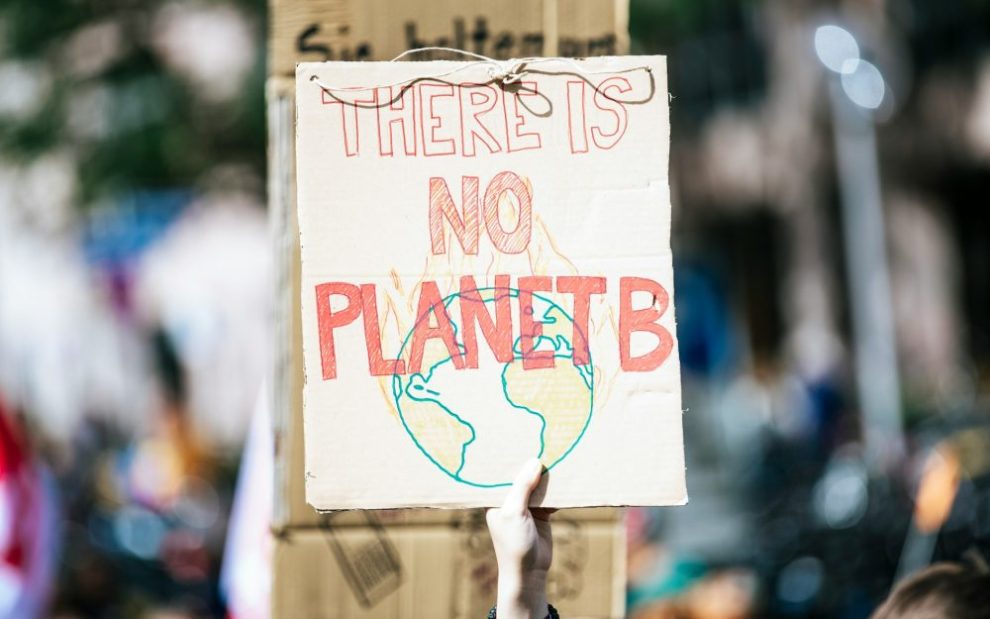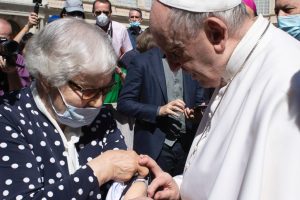I read our pope’s documents in Spanish to get an intimate sense of what he’s feeling. I also refer to him as Francisco, because as a Latin American and a child of immigrants, he teaches us to listen to the most vulnerable. Today the most vulnerable of God’s creatures is the planet itself, and it is the Earth’s cries that reverberate the poverty, displacement, famine, and suffering of the poor.
From the start of Laudate Deum, Papa Francisco provides a key to understanding why caring about creation matters. Caring about our planet’s suffering is about following Jesus. We can’t just know about Jesus, but we need to accompany him in such a way that his tenderness toward creation, from the lilies to the birds, will enter our hearts.
Laudate Deum’s goal is to move us. As he addresses the letter to “all people of good will,” it is clear that Francisco as prophet hopes the urgency in his voice will break our hearts and his truth-telling will spur us to effective action. If Laudato Si’ is a masterful and authoritative document about the state of our environment, Laudate Deum is a prophetic scream of sorrow and a call to action. How can we possibly claim to love God and intentionally destroy all God has made?
We need to hear Francisco’s broken heart in this letter as he counts off eight years since Laudato Si’. “Our world is crumbling,” he tells us, and “we are close to a breaking point.” Surprisingly, he begins his impassioned appeal by quoting the U.S. Conference of Catholic Bishops from a little-known and anemic “background” document in which they claim to promote “prudent action predicated on justice to address the growing impact of global climate change.” The Holy Father knows that unless we get the United States to make serious changes (the United States is one of the two most polluting countries on Earth, and the other is China), the global inaction against climate change will continue. He also knows that Catholics in the United States, embroiled in pointless and damaging culture wars, have largely ignored Laudato Si’. This affects the whole world.
Last year, I addressed a large group of Latino/a Catholic lay ministers and catechists about Laudato Si’. I asked them, “Is your parish community involved in teaching and action on behalf of the environment?” I wanted to be wrong in my prediction. I wanted them to raise their hands and tell me of robust programs and engaged communities. I wanted us to be filled with hope. Yet, in a room of hundreds of Catholics, only a few raised their hands. The surprise and sadness that struck us was palpable.
In 2021, Creighton University published a study reviewing more than 12,000 English-language columns written by bishops in their official publications. Their goal was to rigorously ascertain the reach of Catholic social teaching about climate change on the U.S. Catholic community. The study’s conclusions are painfully sobering: Fewer than 1 percent (yes, you read that right) of these writings meant for the formation of Catholics in the pews mentioned climate change.
My experience with faith communities bears this out. In this country, we Catholics are stuck in what the study calls “silence and denialism” on the single most important threat to life. Unlike in other countries, where Laudato Si’ has seeded all kinds of ecclesial movements and ministries in support of planetary flourishing as an essential act of Christian faith, the pope’s call to ecological justice has seemingly remained unheard in the United States. The study reports that even in the few instances where climate change was mentioned by the bishops, “they diminished and distanced themselves from Church teaching on this issue.” Astonishingly, in several of these columns “the bishop downplayed the pope’s authority to teach about climate change.”
The Creighton study makes clear that partisan politics is playing an outsized role in the United States and discourages attention and action on climate change. We are living in an atmosphere where the political, understood as the necessary actions for a society to function and live together, has been collapsed into partisan ideological rigidity. Because of this, Christian requirements rooted in Jesus himself—caring for the poor, the sick, the imprisoned, and the stranger—are denied in favor of an ideologically conservative partisan agenda. In Laudate Deum Francisco exposes the strategy of holding on to power by ridicule, misinformation, blaming the poor, and claiming job losses. None of these claims are true and each of us should be busy dismantling them.
We are the church, and it is high time for us to step up, as Papa Francisco exhorts us, and demand education and action on climate change for our church communities as an act required of our faith in the God of life.
This article also appears in the January 2024 issue of U.S. Catholic (Vol. 89, No. 1, pages 14-15). Click here to subscribe to the magazine.
Image: Unsplash/Marcus Spiske













Add comment